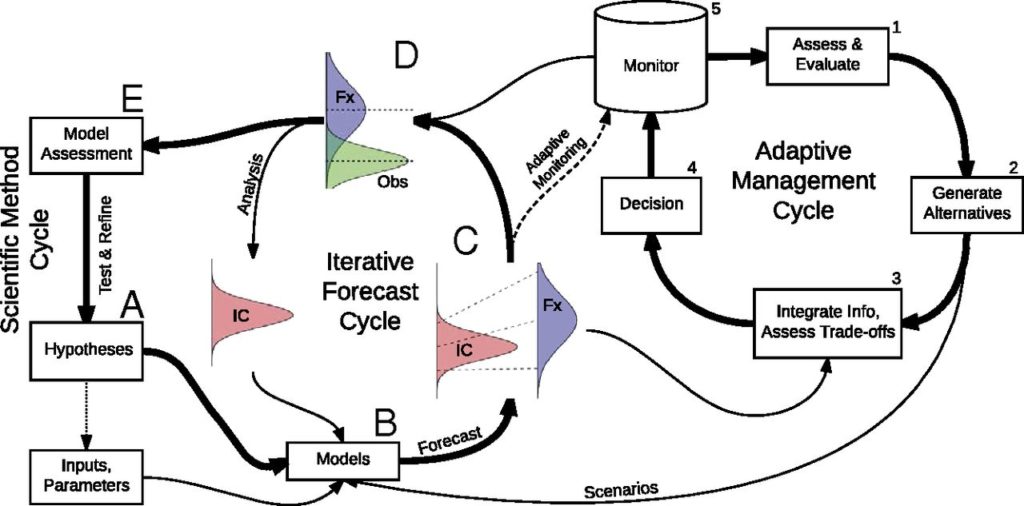The Ecological Forecasting Initiative is an international grassroots consortium aimed at building and supporting an interdisciplinary community of practice around near-term (daily to decadal) ecological forecasts.
What is ecological forecasting?
Ecologists have long tried to predict natural systems for both basic and applied purposes. Clark et al. 2001 first defined ecological forecasting as “…the process of predicting the state of ecosystems, ecosystem services, and natural capital, with fully specified uncertainties, and is contingent on explicit scenarios of climate, land use, human population, technologies, and economic activity.”
Much of the imperative to focus on ecological forecasting comes from the need to respond to the multitude of environmental problems facing society and the aspiration that environmental decisions be made with the best available science in hand. In fields such as fisheries, wildlife, algal blooms, wildfire, and human disease, we often need to know how ecosystems, and the services they provide, are going to change in the future and how do humans affect those trajectories? Because all decision making is ultimately based on what will happen in the future, either under the status quo or different decision alternatives, environmental decision making ultimately depends on forecasts. Ecological forecasters try to make those forecasts, and their uncertainties, explicit.
At the same time, making ecology more predictive is also key to advancing basic science and maturing as a discipline. Generating forecasts forces us to synthesize what we already understand about a system, embodying that understanding in a quantitative model of how we think things will be different in the future, at a new location, or under different conditions. This potential to simultaneously improve basic science and increase social relevance represents a promising win-win scenario.

Near-term Ecological Forecasting Cycle; Dietze et al. 2018
Why near-term forecasting?
To date, much of the research on ecological forecasting has focused on long-term projections (e.g. climate change scenarios for 2100), which are important but are beyond the timeline of many management and policy decisions and do not provide much opportunities for learning (we won’t know for decades if our forecasts are correct). By contrast, frequent iterative forecasts provide constant feedback, which accelerates learning and helps prioritize future research. Such forecasts embody the scientific method, requiring that (i) all predictions be specific and quantitative, and (ii) all predictions be tested against future events (out-of-sample validation). By being quantitatively precise about both our predictions and how confident we are in them, forecasts are more open to direct refutation. Forecasts encourage robust, reproducible science, and their a priori specification provides natural protection against overfitting. The constant feedback of iterative forecasting isn’t just a benifit to basic science, it also allows us to provide societally-relevant information closer to real-time in a way that facilitates more adaptive approaches to management and decision making.
Article: Can scientists learn to make ‘nature forecasts’ just as we forecast the weather?
Why do we need a consortium?
Our goal is to discover whether nature is predictable. That can’t be done by forecasting one thing really well, it requires that we attempt to forecast a lot of different processes at a lot of different locations and then examine the higher-level patterns to what makes some processes and spatial/temporal scales more predictable than others. Achieving that goal will require a community of researchers working together.
At the same time, the science and practice of ecological forecasting would be improved by better communication and sharing in many areas (theories, tools, training, etc.). There are many silos within ecology that are not always aware of the latest forecasting research in other areas. Similarly, ecological forecasting relies on interdisciplinary coordination and collaboration with researchers in a wide range of other disciplines, such as decision science, the physical environmental sciences, statistics, informatics/data science, and computer science. Ecological forecasts often utilize the increasing availability of near real-time ecological data, which requires coordination with data providers, sensor engineers, and the cyberinfrastructure delivering data. Finally, ecological forecasters need to work closely with agencies, industry, citizen scientists, and other stakeholders and end users on the co-production of societally useful forecasts.
See our Shared Values & Operating Principles and Procedures here.
EFI’S CORE VALUES
- We treat others with kindness, respect, and consideration
- We empower and create space for one another
- We welcome and support a diverse community
- We express gratitude and recognition
EFI’s full Code of Conduct is available here.

